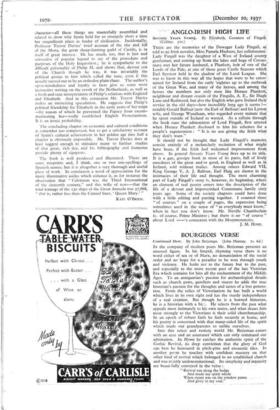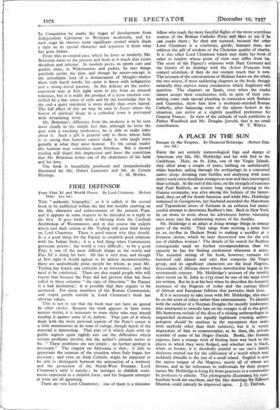BOURGEOIS VERSE
Continual Dew. By John Betjemp. (John Murray. 75. 6d.)
IN the company of modern poets Mr. Betjeman presents an unusual figure. In his limpid, rhyming verse there is no word either of sex or of Marx, no denunciation of the social order and no hope for a paradise to be won through youth and violence. He looks not to the future but to the past, and especially to the more recent past of the late Victorian Era which contains for him all the enchantment of the Middle Ages. To an antiquarian's passion for archaeological details such as church pews, gasoliers and stucco he adds the true historian's passion for the thoughts and tastes of a lost genera- tion. From the relics of Victorianism he has built a world which lives in its own right and has the sturdy independence of a real creation. But though he is a learned historian, he is a historian with a bin. He selects from the past what appeals most intimately to his own tastes, and what draws him most strongly to- the Victorians is their solid churchmanship. In an epoch of robust faith he feels securely at home, and his poetry is concerned with that many-sided life of the spirit which made our grandparents so unlike ourselves.
Into this select and remote world Mr. Betjeman enters with an ease and -an assurance vithich can only command our admiration. In Hymn he catches the authentic spirit of the Gothic Revival, its deep conviction, that the glory of God can best be honoured in pitch-pine and encaustic tiles. In another po,:m he touches with confident mastery on that other kind of revival which belonged to no established church and was strictly undenominational. Its simplicity and intensitY
are beanlifully, conveyed in the : . , "Revival ran along the hedge And made my spirit whole When steam was on the window, panes And glory in my soul." From this re-created past, which he loves so tenderly, Mr. Betjetnan turns to the present and finds in it much that seems decadent and inferior. In modern poets, in sports cars and garden cities, in Wykehamists and padres, he sees things painfully unlike the past, and though he never—except in the apocalyptic fury of a denunciation of Slough—slashes them with harsh words, his satire is fierce with indignation and a strong moral passion. In this delicate art the under- statement may at first sight seem to rise from an amused tolerance, but it is really the product of a tense emotion con- trolled by a fine sense of style and by the knowledge that in the end a quiet statement is more deadly than overt hatred. The full effect of this art may be seen in Exeter where the horror of spiritual decay in a cathedral town is portrayed with devastating irony. Mr. Betjeman's difference from the moderns is to be seen most clearly in the simple fact that, although he loves the past with a touching tenderness, he is able to make jokes about it. Such a gift is granted only to those whose faith is so strong that humour cannot shake it, who laugh most genially at what they most honour. To the casual reader Ibis humour may sometimes seem frivolous. But a second reading will dispel this impression and leave the conviction that Mr. Betjeman writes out of the abundance of his faith and his love.
The book is beautifully produced and sympathetically illustrated by Mr. Osbert Lancaster and Mr. de Cronin
In Competition he marks the stages of development from Independent Calvinism to Wesleyan modernity, and for each stage he chooses some significant symbol which sheds a light on its special character and separates it from what has gone before.























































 Previous page
Previous page